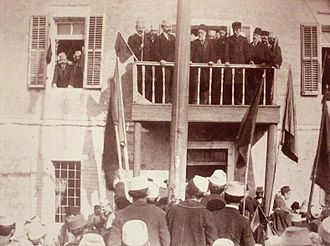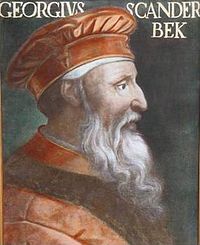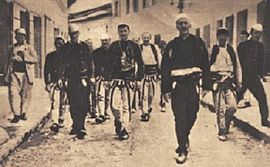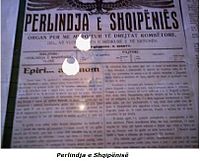- Albanian Declaration of Independence
-
Albanian Declaration of Independence 
Ismail Qemali after the session of the Assembly of Vlorë declaring to Albanian People the decision of independence.Created October 1912 Ratified 17 December 1912 Location Vlorë (today in Albania) Authors Ismail Qemali Signatories 83 delegates Purpose Independence of the Albanian Vilayet from the Ottoman Empire The Albanian Declaration of Independence (Albanian: Shpallja e Pavarësisë, or Deklarata e Pavarësisë) is the declaration of independence of the Albanian Vilayet from the Ottoman Empire. Albania was proclaimed independent in Vlorë on November 28, 1912.
Contents
Background
Further information: Albanian Revolt of 1912, Albanian vilayet, First Balkan War, and All-Albanian CongressThe success of the Albanian Revolt of 1912 sent a strong signal to the neighboring countries that the Ottoman Empire is weak.[1] The Kingdom of Serbia opposed the plan for an Albanian vilayet, preferring a partition of the European territory of the Ottoman Empire among the four Balkan allies.[2] Balkan allies planned the partition of the European territory of the Ottoman Empire among them and in the meantime the territory conquered during First Balkan War was agreed to have status of the Condominium.[3] That was the reason for Ismail Qemali to organize All-Albanian Congress in Vlora.[4]
Assembly of Vlorë
Further information: Assembly of VlorëHistory of Albania  PrehistoryAntiquityMiddle AgesOttoman AlbaniaPost-IndependenceContemporary Albania
PrehistoryAntiquityMiddle AgesOttoman AlbaniaPost-IndependenceContemporary AlbaniaUnder these circumstances, delegates from all over Albania were gathered in the Assembly of Vlorë (Albanian: Kuvendi i Vlorës). Ismail Qemali returned to Albania with Austro-Hungarian support and, at the head of a swiftly convened national assembly, declared Albanian independence in the town of Vlora on 28 November 1912. The declaration was more theoretical than practical because Vlora was the only town in the whole country under the delegates’ control―yet it proved to be effective in the vacuum of power. Though Albanian independence was recognised de facto on 17 December 1912 at the London Conference of Ambassadors, it was not until 29 July 1913, after the second Balkan War and the solving of the delicate problem of Shkodra, that the international community agreed to recognise Albania as a neutral, sovereign and hereditary principality. The newspaper "Përlindja" of Vlora described it as follows:
The National Assembly, composed of delegates from all over Albania and convening here in Vlora, opened today at four in the afternoon at the house of Xhemil bey. Ismail Kemal bey, as the prime initiator of the gathering, took the floor and explained to the delegates the purpose of the assembly, that is, that they all must strive to do what is necessary to save Albania from the great perils it is now facing. The chairman, Ismail Kemal Bey, then took the floor and, in an ardent, fluid and reasonable speech, stated that although they had always been faithful to the Ottoman Empire, the Albanians had never forgotten their own language and nationality, the best proof of this being the endeavours and uprisings that had taken place from time to time, in particular over the last four years, to preserve their rights and customs. The Ottoman Government had never taken their interests into consideration and had never been willing to recompense the Albanians for the great services they had rendered. It had recently shown some interest in coming to an understanding with our people, but had not given proof of good faith and had not taken all the steps needed to appease and satisfy the Albanians. War had recently broken out with four countries in the Balkans that were seeking change and rights for their peoples, united by their ethnicity and religion. Later, these countries put aside their initial objective and, as the war was going well for them, they agreed to divide the Empire up among themselves, including Albania. Realizing that the Turkish army had been defeated and that the Empire would not survive, the Albanians, who had played a greater role in the fighting than the soldiers, hastened to take requisite steps in their own interests as owners of the country. For this reason, Ismail Kemal bey departed for Istanbul and, having come to an understanding with the Albanians of Bucharest, too, set off for Vienna where he reached an agreement with the Great Powers that had vital interests in the Balkans. As there was no more hope of saving Albania by means of arms, the only road to salvation was to separate Albania from Turkey. Ismail Kemal bey promoted this idea and objective, that was well received by all the Great Powers, in particular by Austria and Italy. It was only Russia that remained somewhat hostile to the idea because of the Slavs, but it did not deny the existence of Albania and an Albanian people. To realise this objective, he invited all Albanians to gather in Vlora and was delighted today to see that his call had not been in vain, and that delegates had been sent from all parts of Albania to reflect together on ways to save the Fatherland. According to Ismail Kemal Bey, the most urgent measures that the Albanian nation must take today are these: that Albania be independent under a provisional government; that a council of elders be elected to assist and supervise the government; and that a commission be sent to Europe to defend Albanian interests among the Great Powers. The delegates unanimously agreed with the words of Ismail Kemal bey and resolved that Albania, as of today, should be on her own, free and independent under a provisional government. The meeting was adjourned until the following day and the delegates went out and greeted the flag that was raised at five thirty in the afternoon.
Declaration of Independence
The assembly of eighty-three leaders meeting in Vlorë in November 1912 declared Albania an independent country and set up a provisional government. The complete text of the declaration was:
In Vlora, on the 15th/28th of November. Following the speech made by the President, Ismail Kemal Bey, in which he spoke of the great perils facing Albania today, the delegates have all decided unanimously that Albania, as of today, should be on her own, free and independent.
Delegates
 Isa Boletini and his men from Kosovo Vilayet in the streets of Vlorë after the Independence was proclaimed
Isa Boletini and his men from Kosovo Vilayet in the streets of Vlorë after the Independence was proclaimed
The 83 Delegates (also called Founding fathers (Albanian: Baballaret e kombit) of the Albanian modern state included the following[5]:
- Berati: Sami Bey Vrioni, Ilias Bey Vrioni, Taq Tutulani, Babë Dud Karbunara;
- Çamëria: Veli Gërra, Jakup Veseli, Rexhep Demi, Azis Tahir Ajdonati;
- Delvina: Avni bej Delvina;
- Dibra: Myfti Vehbi Dibra, Sherif Lengu;
- Durrësi: Abaz Efendi Çelkupa, Mustafa Agë Hanxhiu, Jahja Ballhysa, Dom Nikollë Kaçorri;
- Elbasani: Lef Nosi, Shefqet bej Daiu, Qemal bej Karaosmani, Dervish bej Biçaku;
- Gjirokastra: Elmaz Boçe, Veli Harxhi, Myfid bej Libohova, Petro Poga, Jani Papadhopulli, Hysen Hoxha;
- Gramsh-Tomorricë: Ismail Qemali Gramshi (not to be confused with Ismail bej Qemal Vlora);
- Janina: Kristo Meksi, Aristidh Ruci;
- Korça: Pandeli Cale, Thanas Floqi, Spiro Ilo,
- Kosovo, Đakovica, Plav-Gusinje: Rexhep Mitrovica, Bedri bej Ipeku, Salih Gjuka, Mit'hat Bey Frashëri, Mehmet Pashë Derralla, Isa Boletini, Riza bej Gjakova, Hajdin bej Draga, Dervish bej Ipeku, Zenel bej Begolli, Qerim Begolli;
- Kruja: Mustafa Merlika-Kruja;
- Lushnja: Qemal bej Mullai, Ferit bej Vokopola, Nebi Efendi Sefa;
- Mati: Ahmet bej Zogolli (later King Zog), Riza bej Zogolli, Kurt Agë Kadiu;
- Ohri and Struga: Zyhdi bej Ohri, Dr. H. Myrtezai, Nuri Sojlliu, Hamdi bej Ohri, Mustafa Baruti, Dervish bej Hima;
- Peqin: Mahmud Efendi Kaziu;
- Përmet: Veli bej Këlcyra, Syrja bej Vlora;
- Pogradeci: Hajdar Blloshmi;
- Shijak: Xhelal Deliallisi, Ymer bej Deliallisi, Ibrahim Efendiu;
- Shkodra: Luigj Gurakuqi;
- Skrapar: Xhelal bej Koprencka; Hajredin bej Cakrani;
- Tepelene: Feim bej Mezhgorani;
- Tirana: Abdi bej Toptani, Murat bej Toptani;
- Vlora: Ismail Qemali, Zihni Abaz Kanina, Zyhdi Efendi Vlora, Qazim Kokoshi, Jani Minga, Eqerem bej Vlora;
- Albanian colony of Bucharest: Dhimitër Zografi, Dhimitër Mborja, Dhimitër Berati, Dhimitër Ilo
National symbols
The same day, Ismail Qemali waved the national flag of Albania, from the balcony of the Assembly of Vlorë, in the presence of hundreds of Albanians. This flag was sewn after Skanderbeg's principality flag, which had been used more than 400 years earlier.
Government
Main article: Provisional Government of AlbaniaOn 4 December 1912, the Assembly of Vlorë created the first Government of Independent Albania, led by Ismail Qemali. It established also a Council of Elders (Albanian: Pleqësia), which would help the Government to it duties. The Assembly of Vlora decided that it will agree to any decision of the Great Powers for the system of Government in Albania and that the Provisional Government would cease to exist after the recognition of independence of the country and the nomination of the monarch.
Recognition of Independence
Diplomatic efforts
Further information: Albanian Congress of TriesteJust as the overseas communities of Albanians had stimulated the patriotic fervor which gradually led to the independence of their homeland, so at this critical juncture they once again demonstrated their solidarity. On 1 March 1913, they convened an Albanian Congress of Trieste, Austria. There were 119 representatives in all, coming from the United States, Romania, Bulgaria, Turkey, Egypt, Italy, and of course from the new state itself. Bishop Fan Noli of Boston was one of the featured speakers.
The congress recognized the provisional government of Ismail Kemal, pledged its faithful support, discussed the ethnic boundaries of the new state and sent strong resolutions to the European capitals and to the London Conference of Ambassadors then in session, appealing for their recognition of Albanian independence and for the lifting of the Greek blockade.
Treaty of London and recognition of independence
See also: Treaty of London (1913) and Albania during the Balkan WarsOn December 1912 the Great Powers met in London to deal with territorial adjustments arising out of the conclusion of the First Balkan War.
After months of wrangling and compromise under the constant threat of a general war, the conference announced its formal decisions on 17 May 1913. The question of Albanian independence that had prompted the Conference of Ambassadors at London came up for discussion at their first session. According to article II of the treaty, the six ambassadors decided that Albania would be recognized as an autonomous state under the sovereignty of the Ottoman sultan.[6]
After the breakout of the Balkan Wars, on 29 July, the ambassadors decided to recognize the total independence and sovereignty of Albania. They provided that it be governed by a European prince to be elected by the powers. Albanian neutrality would be jointly guaranteed by the six great powers. They also appointed an International Commission of Control for Albania, to be composed of one representative from each of the six powers and one Albanian. This commission would supervise the Albanian government's organization, finances and administration for a 10-year period. Dutch officers would organize the gendarmerie.
Soon after the Declaration of Independence Albania was occupied by the Balkan League member states (Serbia, Montenegro, and Greece). The Occupation of Albania (1912–1913) took place during the Balkan Wars.
Commemoration in Albanian banknotes
The façade of the building where the independence was proclaimed is depicted on the reverses of the Albanian 200 lekë banknote of 1992-1996,[7] and of the 500 lekë banknote issued since 1996.[8]
See also
- League of Prizren
- Provisional Government of Albania
References
- ^ Warrander, Gail; Verena Knaus (November 2007). Kosovo. United States of America: The Globe Pequot Press. p. 12. ISBN 1-84162-199-4. "At the same time the rebellion sent strong signal to Kosovo neighbors that the Ottoman Empire was weak."
- ^ "Report of the International Commission to Inquire into the Causes and the Conduct of the Balkan Wars". Washington D.C.: Carnegie Endowment for International Piece. 1914. p. 47. http://www.archive.org/stream/reportofinternat00inteuoft#page/46/mode/2up/search/47. Retrieved January 10, 2011. "The Servians hastened to oppose the plan of a "Greater Albania" by their plan for partition of Turkey in Europe among the Balkan States into four spheres of influence."
- ^ "Report of the International Commission to Inquire into the Causes and the Conduct of the Balkan Wars". Washington D.C.: Carnegie Endowment for International Piece. 1914. p. 49. http://www.archive.org/stream/reportofinternat00inteuoft#page/46/mode/2up/search/47. Retrieved January 10, 2011. "In a few weeks the territories of Turkey in Europe .. by the Balkan allies....in their hands as condominium"
- ^ Zhelyazkova, Antonina (2000). "Albania and Albanian Identities". International Center for Minority Studies and Intercultural Relations. Archived from the original on January 10, 2011. http://www.webcitation.org/query?url=http%3A%2F%2Fwww.omda.bg%2Fimir%2Fstudies%2Falban_id28.html&date=2011-01-10. Retrieved January 10, 2011. "calling together an all-Albanian congress. On 28 November 1912, delegates from all over the country gathered in Vlora"
- ^ Schmidt-Neke, Michael (1987). Entstehung und Ausbau der Königsdiktatur in Albanien, 1912-1939. Oldenbourg Verlag. p. 320. ISBN 3486543210. http://books.google.com/books?id=vpIFsca3lKYC&pg=PA320&dq=%22Dhimit%C3%ABr+Ilo%22&hl=en&ei=DaPtS6mcKMG88gbUw9j9Cg&sa=X&oi=book_result&ct=book-thumbnail&resnum=2&ved=0CC0Q6wEwAQ#v=onepage&q&f=false.
- ^ Mowat, R.B. (1916). Select Treaties and Documents 1815-1916. Oxford Clarendon Press. pp. 120–121. http://www.zum.de/psm/div/tuerkei/mowat120.php.
- ^ Bank of Albania. Currency: Banknotes withdrawn from circulation. – Retrieved on 23 March 2009.
- ^ Bank of Albania. Currency: Banknotes in circulation. – Retrieved on 23 March 2009.
External links
Sources
- Albanian Academy of Science. History of Albanian People. Tirana: Botimet Toena, 2007. ISBN 9994312693, ISBN 9789994312696.
- Robert Elsie. The Declaration of Albanian Independence
- Lef Nosi. Dokumenta historike për t'i shërbye historiës tone kombëtare. Tirana: Instituti i Historisë, 2007. ISBN 9995610043, ISBN 9789995610043. (in Albanian)
- Edith Pierpont Stickney, Southern Albania 1912-1923
 Albania topics
Albania topics- Index
- Outline
Symbols People History - Origins
- Praevalitana
- Epirus Nova
- Middle Ages
- Albania under the Bulgarian Empire
- Albania under the Serbian Empire
- Principality of Arbër
- Kingdom of Albania
- Albanian Principalities in Middle Ages
- League of Lezhë
- Venetian Albania
- Ottoman Albania
- Albanian Pashaliks
- Massacre of the Albanian Beys
- Albanian National Awakening
- Revolts of 1833–1839
- Revolt of 1843–1844
- Revolt of 1847
- League of Prizren
- League of Peja
- Revolt of 1910
- Battle of Deçiq
- Independence Declaration
- Provisional Government of Albania
- Albania during the Balkan Wars
- Principality of Albania (1914–1925)
- Italian Protectorate on southern Albania
- Vlora War
- Republic of Mirdita
- Albanian Republic (1925–1928)
- Albanian Kingdom (1928–1939)
- Albania under Italy (Invasion
- Colonization)
- Albania under Germany
- Resistance
- Communist Albania (1946–1992)
- Post-Communist Albania (since 1992)
- Timeline to 1993, 1994–Present
Politics Geography - Cities:
- Geographical Regions:
- Northern Mountain Range
- Southern Mountain Range
- Western Lowlands
- Central Mountain Range
- Mountains:
- Seas:
- Rivers:
- Drin River
- Buna River
- Vjosë
- Black Drin
- Lakes:
- Lake Skadar
- Lake Ohrid
- Lake Prespa
- Lagoons:
- Karavasta
- Narta
- Plains:
- Myzeqe
- Korçë Plain
- Zadrima
- Capes:
- Cape of Gjuhëz
- Cape of Rodon
- National Parks:
- Butrint
- Lura
- Llogara
- Thethi
- Valbona Valley
- Shebenik-Jabllanica
- Fir of Hotova
- Karaburun-Sazan
Economy Military - Military
- Air Force
- Rapid Reaction Brigade
- Naval Defense Forces
- Joint Forces Command
- Support Command
Culture - Languages
- Costume
- Nationalism
- Literature
- Cinema
- Cuisine
- Emigration
- Music
- Sports
- Holidays
- Religion
- Television
- Radio
- Mythology
- Epic Poetry
Religion - Islam
- Albanian Orthodox Church
- Roman Catholicism
- Protestanism
- Byzantine Catholicism
Categories Categories:- Albanian Declaration of Independence
- 1912 in international relations
- 1912 in Albania
Wikimedia Foundation. 2010.


